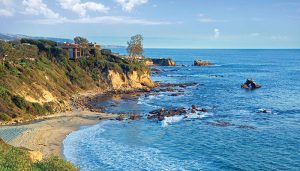Another postscript to my Hydra trip – on weekends (which, happily, is when I was there), the aforeblogged Douskos a.k.a. Xeri Elia restaurant has live music like unto this:
Tag Archives | Personal
Despair Could Never Touch a Morning
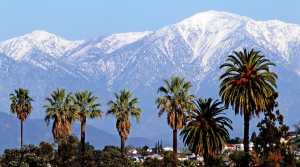
The air was cool, and smelled of sage. It had the clarity that comes to southern California only after a Santa Ana wind has blown all haze and history out to sea – air like telescopic glass, so that the snowtopped San Gabriels seemed near enough to touch, though they were forty miles away. The flanks of the blue foothills revealed the etching of every ravine, and beneath the foothills, stretching to the sea, the broad coastal plain seemed nothing but treetops ….
The sun was obscured by a cloud for a moment, then burst out again. Big clouds like tall ships coasted in, setting sail for the mountains and the desert beyond. The ocean was a deep, rich, blue blue, a blue in blue within blue inside of blue, the heart and soul and center of blue. Blinding chips of sunlight bounced on the swelltops. Liquid white light glazed the apricot cliff of Corona del Mar, the needles of its Torrey pines like sprays of dark green. Ironwood color of the sun-drenched cliff. … Behind him Orange County pulsed green and amber, jumping with his heart, glossy, intense, vibrant, awake, alive. His world and the wind pouring through it.
As you might guess (since it’s been the subject of my two most recent “guess the author” posts – here and here), I recently got around, at last, to reading the “Three Californias” trilogy (The Wild Shore, The Gold Coast, and Pacific Edge) by Kim Stanley Robinson, about whose other work I’ve blogged before (see, e.g., here and here). (For Robinson’s own account of the origin and meaning of his trilogy, see this interview.)
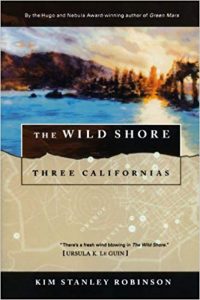
The trilogy concerns three possible futures for southern California: a) post-apocalyptic, b) urban sprawl, and c) ecotopia – three timelines linked by one character who occurs in all three (and who seems to have a vague inkling of his other lives, his alternative pasts and possible futures – see The Wild Shore, pp. 214-221, and Pacific Edge, pp. 63 and 181), as well as by some structural and thematic elements (for example, each novel begins with an archeological excavation and ends with an attempt at sabotage). There are echoes of Ursula K. Le Guin and Philip K. Dick (Robinson was a student of one and wrote his dissertation on the other), as well as prefigurations of his own later fiction, but the trilogy is very much its own thing – and, as one would expect from Robinson, thought-provoking and beautifully written.
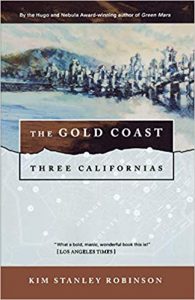
While Robinson’s three futures represent, in effect, two bad possibilities and one good one, the portrait is not simplistic: the two dystopian novels offer glimmers of hope and spaces of freedom, while the third, utopian novel represents utopia not as a fixed end point but as something that needs to be continually fought for, defended, and extended – which seems to me to be the right way to think about it. (And his utopia is certainly not one in which all the protagonists live happy lives or find their way to happy endings.)
When it comes to the specific content of his utopia, as opposed to his abstract idea of how to think about utopia as such, Robinson’s vision is much more of a mixed bag, from my (or more broadly, any LWMA) point of view. As I’ve said before, Robinson’s economic and political ideals leave him with “one foot in vital, grassroots, quasi-anarchist radicalism” and “the other in dreary, top-down, paternalistic authoritarianism.” (This conflict actually gets lampshaded somewhat – e.g., at pp. 282-285 of Pacific Edge – though without resolution.) But the trilogy is well worth reading despite this.
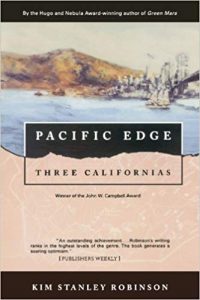
I particularly want to recommend the trilogy, though, not just to readers in general but specifically to those who know and love California, especially southern California. Anyone for whom the towns and climate and natural landscape of the region are a geography of their own heart will find a special joy in recognising them in their varied incarnations through the three novels.
(There’s a certain irony in the fact that Robinson, who has the good fortune to live in the California of the present, has written a trilogy filled with longing for Californias of the past and possible future, but mostly frustration with the California of the present – which by contrast looks pretty damn good to me, despite its admitted flaws. Yes, I’m homesick!)
Flawless Lawless
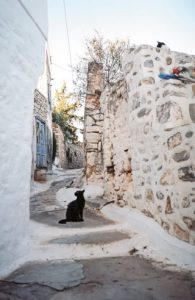
As a footnote to my Greek trip – two items I recently learned about Hydra:
a) Its cats are thought to be descended from cats kept on 18th-century pirate ships to control mice.
b) Henry Miller once described the layout of Hydra Town as the “epitome of flawless anarchy.”
The Skull of This Our Life
There are a couple of stretches along First Avenue in Opelika where some buildings (including a factory) were demolished not too long after I first came to the area, and they’ve been slowly clearing away the rubble ever since. And I do means slowly, as in: with each passing year some slight alteration to the landscape is perceptible. The progress has been glacial (if anything under the Alabama sun can truly be called “glacial”).
But lately I’ve noticed a very slight acceleration in the rubble-clearing process, reminding me that these ruins will not endure forever. So I’ve kept meaning to take photos, but I never seem to have my camera with me when I pass by. But now that I have a smartphone I always have a camera with me, so today was the day.
Voltairine de Cleyre thought the ruins of modern industrial civilisation would compare unfavourably with those of past civilisations:
“And if some archaeologist of a long future shall some day unbury the bones of our civilization, where ashes or flood shall have entombed it, he will see this frightful idea stamped on the factory walls he shall uncover, with their rows and rows of square light-holes, their tons upon tons of toothed steel, grinning out of the skull of this our life; its acres of silk and velvet, its square miles of tinsel and shoddy. No glorious marbles of nymphs and fawns, whose dead images are yet so sweet that one might wish to kiss them still; no majestic figures of winged horses, with men’s faces and lions’ paws casting their colossal symbolism in a mighty spell forward upon Time, as those old stone chimeras of Babylon yet do; but meaningless iron giants, of wheels and teeth, whose secret is forgotten, but whose business was to grind men up, and spit them out as housefuls of woven stuffs, bazaars of trash, wherethrough other men might wade. The statues he shall find will bear no trace of mythic dream or mystic symbol; they will be statues of merchants and ironmasters and militia-men, in tailored coats and pantaloons and proper hats and shoes.”
And maybe so. Certainly some “bazaars of trash” are evident in these photos. But there’s a certain solitary grandeur evident in some of them as well.
Remembrance of Things Past
My dear friend Paul Fine just sent me two photos from our college graduation in 1985. The first one shows me with my mother, the second shows me with Paul:
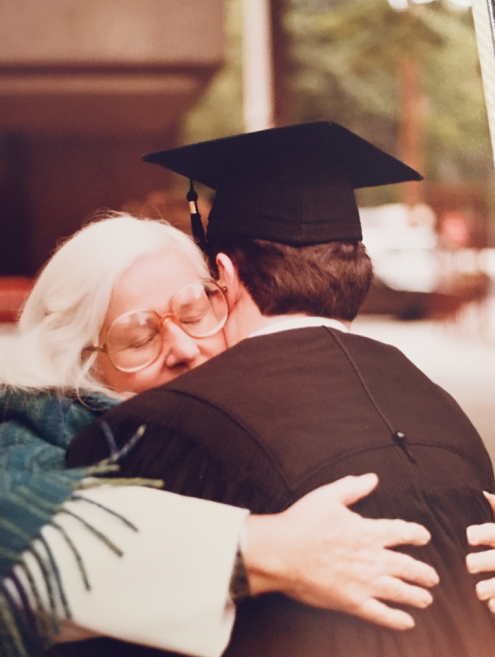

Mystery Man
I’ve written previously about my late mother (see here and here), and there is much more to say if I ever have the time. But today, in honour of Father’s Day, I thought I’d say a little about my father.
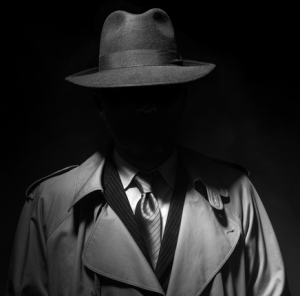
And a little is all there is to say. I don’t remember him; I don’t even have a photo of him (all photos were lost in a move – the reason that, ever after, my mother and I always took family photos with us in the car when we moved, rather than entrusting them to movers). He was raised in an orphanage, with no living relatives; I gather he did know the names of his deceased parents, but my mother didn’t know or didn’t remember. In fact my mother knew fairly little about him, but figured she’d have years ahead to find out. All I know about him is what I remember from my mother’s stories, which isn’t much, since in her later years the focus of her reminiscences slid back more and more to her childhood.
My father, Phillip (or Philip?) Patrick Long, was born on, I believe, 11 November 1922, in, I believe, Kansas. He was of Irish and Czech ancestry – on, I believe, his father’s and mother’s side respectively. The cause of his parents’ early deaths I do not know. He served in World War II, in the European theatre. He disapproved of fellow soldiers who came back with trophies from Germany, calling it stealing.
He attended either the University of Kansas or Kansas State University, but whether before the war, or after, or both, I’m not sure. Later he worked as a business consultant and efficiency expert, as well as in “oil sales,” whatever that is exactly. He met my mother at a party in, I believe, Newport Beach (I’m not sure of the year), though they didn’t get involved immediately.
He was very bright, with many interests – he taught my mother the phrase “spacetime continuum” (in what context I don’t know) which she in turn taught me at an early age. When he proposed to my mother, he did so in what she described as a cautious, abstract, intellectual way: “If person A and person B,” something something. But despite how that might sound they were wildly in love. I don’t know what year they married either; perhaps 1962? My mother always wore the unusual wedding ring he gave her (it’s hard to describe – varied gold and silver relief patterns) until to her great distress it slipped unnoticed off her finger in a Kroger grocery in Opelika a few years before her death and she was unable to find it.
While not particularly athletic by nature, he tackled a number of sports, not out of enjoyment but to prove to himself that he could master them. He didn’t like the bother of owning a car and preferred to lease one; he laughed at the sentimentality of my mother’s growing emotionally attached to her car. He generally found my mother too sentimental, teasing her over her religious views, her involvement in causes like the Anti-Vivisection League, and the like. But in their political arguments she managed to convert him from New Deal Democrat to Goldwater Republican. When he’d had a successful business deal he would light his cigarette with a burning hundred dollar bill; my mother believed he did this only in the knowledge that she would frantically put out the flame – the bills always survived.
He occasionally had a certain facial expression that my mother always distrusted, one that she thought meant he was trying to con her. But years later, when she discovered that I sometimes had exactly the same expression, she decided that perhaps she’d been mistaken.
Despite not having much money, my parents both loved to travel and were very spontaneous; they kept a packed overnight bag in the car at all times so that they could suddenly head off into the California hills if the mood struck them.
My mother didn’t want him to meet her mother, knowing as she did her mother’s insidious way of undermining relationships. He just laughed: “I’m not afraid of her!” But in the event they never met. That was okay with him; he had no interest in my mother’s family or past – he was focused on the future. (“He’s black, isn’t he? That’s why you don’t want me to meet him!” was my grandmother’s characteristic reaction – the most dire possible explanation from her point of view.)
My mother wanted to try natural childbirth. “Absolutely not,” he insisted, for which she was later grateful (although she was in fact, like me, never much helped by anaesthetic). During my mother’s pregnancy he kept putting off an important business trip until after the projected birth date, which kept getting later and later as I failed to make my appearance. Finally he could delay no longer, and so wasn’t in town when I was born; but he returned immediately once he got the news. When he visited the hospital, my mother was slightly miffed that he went to see me first before seeing her.
He hadn’t expected to enjoy fatherhood but to his surprise was crazy about me, enjoyed holding me and feeding me and playing with me. “If this kid grows up with your beauty and my brains he’ll be unstoppable,” he teased her. (As if.)
My father was away frequently on business trips about which my mother knew little. Finally, when I was still a baby, there was the business trip from which he didn’t come back. She had no idea what had happened, and for a while believed he had abandoned her. (Her harrowing childhood had led her to be slow to trust, and always to expect betrayal.) Then someone vaguely connected with my father’s business belatedly informed her that he had died in a plane crash (charter, presumably) in Latin America. If they told her more, she didn’t remember the details by the time I thought to ask about them. In later years she suspected that he had secretly been in the CIA or something of the kind.
And that’s it. All I know, or can remember at the moment anyway, about my mysterious father.
